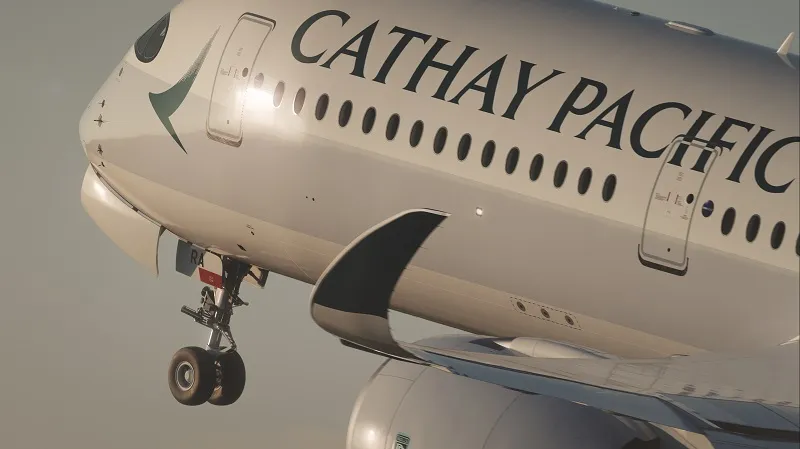
Cathay buys low-cost carrier Hong Kong Express
Mar 27, 2019

Cathay Pacific has acquired Hong Kong Express, a low-cost airline, as part of its strategy to expand its market presence and diversify its operations. This acquisition allows Cathay to enhance its offerings in the competitive travel sector, particularly targeting budget-conscious travelers. Hong Kong Express, known for its extensive network of regional routes, will enable Cathay to tap into the growing demand for affordable air travel in Asia. The deal reflects Cathay's commitment to strengthening its position in the aviation industry while adapting to changing consumer preferences and market dynamics.
Cathay Pacific Airways has made headlines with its recent acquisition of the low-cost carrier Hong Kong Express. This strategic move is expected to reshape the aviation landscape in Asia and boost Cathay's position in the competitive market. With this purchase, Cathay aims to diversify its offerings and cater to a broader range of travelers, particularly in the budget segment. Below, we explore the implications of this acquisition and what it means for the future of air travel in the region.
The Significance of the Acquisition
The acquisition of Hong Kong Express is a significant step for Cathay Pacific as it seeks to expand its market share. By incorporating a low-cost carrier into its portfolio, Cathay is positioning itself to attract a wider audience, especially those who prioritize affordability over premium services. This move is particularly relevant in the post-pandemic recovery phase, where many travelers are looking for budget-friendly options.
Market Positioning
With the rise of low-cost airlines, traditional carriers like Cathay Pacific have faced increasing pressure to adapt their business models. The integration of Hong Kong Express allows Cathay to tap into the growing demand for economical travel. According to market research, budget airlines have seen a surge in popularity, with an estimated 30% increase in bookings compared to pre-pandemic levels. This acquisition aligns with Cathay’s strategy to remain competitive and relevant in a rapidly evolving market.
Benefits of the Acquisition
| Benefit | Description |
|---|---|
| Diversification | Cathay can now offer a range of services from premium to budget travel, catering to different customer segments. |
| Increased Capacity | Adding Hong Kong Express's fleet increases the total number of routes and flights available to travelers. |
| Market Share Expansion | The acquisition enhances Cathay's presence in the low-cost market, enabling it to compete more effectively against other budget airlines. |
| Operational Synergies | Cathay can leverage its existing infrastructure to optimize operations and reduce costs. |
Customer Impact
For travelers, the acquisition means more options when booking flights. Customers who prefer budget travel will benefit from Hong Kong Express's extensive route network, which includes popular destinations across Asia. Furthermore, Cathay plans to maintain Hong Kong Express's brand identity while integrating it into its operational framework. This approach ensures that loyal customers of Hong Kong Express continue to receive the affordable travel options they enjoy.
Future Growth Prospects
The future of Cathay Pacific looks promising with this acquisition. Industry experts predict that the low-cost travel segment will continue to grow, driven by increasing consumer demand for affordable travel options. Cathay's investment in Hong Kong Express is a proactive measure to capture this market trend. As the airline industry recovers from the pandemic, Cathay's diversified portfolio will likely provide it with a competitive edge.
Challenges Ahead
While the acquisition offers numerous benefits, it also presents challenges. Integrating a low-cost carrier into a full-service airline requires careful management of brand identity, operational efficiencies, and customer service standards. Cathay must ensure that the quality of service provided by Hong Kong Express remains high, even as it operates on a budget model. Additionally, maintaining profitability in a highly competitive environment will be crucial for the long-term success of this acquisition.
Conclusion
Cathay Pacific's acquisition of Hong Kong Express marks a pivotal moment in the airline's strategy to adapt to changing market dynamics. By embracing the low-cost carrier model, Cathay is positioning itself to attract a broader audience and remain competitive in the evolving aviation landscape. As the travel industry continues to recover, this acquisition could prove to be a game-changer for Cathay, offering travelers more choices and fostering a new era of air travel in Asia.
In summary, with the strategic purchase of Hong Kong Express, Cathay Pacific is set to redefine its service offerings and enhance its market presence. The combination of traditional and low-cost travel options provides a unique opportunity for growth and customer satisfaction, which is vital in today’s competitive airline industry.
Related Articles

Explore Thailand: The Best Islands to Visit for Paradise, Adventure, and Relaxation

The Ultimate Guide to the Best Islands in Thailand for Your Next Getaway

Do babies need passports? How to get a passport for a newborn

How to get a U.S. passport fast: here’s how to expedite the process

What is Mobile Passport Control: 5 reasons why you should use it

SENTRI vs. Global Entry: A detailed guide

Do you need a passport to go to the Bahamas? Let’s find out

Do you need a passport to go to Mexico? A detailed guide

Do you need a passport to go to Canada? We got the answer

Do You Need a Passport for a Cruise: An Essential Travel Guide

Booster Seat Requirements: All the Rules to Follow in Your Rental Car

What Are the World’s Most Powerful Passports, and How Does Yours Rank?

How to Take a Passport Photo at Home: A Helpful Guide

You've got to have heart! Southwest's new livery

Your opinion: Should water be free on low cost carriers?

Young women bolder than guys as solo travellers
